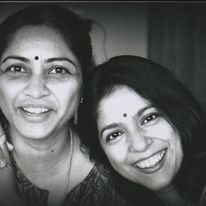Please don’t believe what they show on the ‘saas-bahu’ serials in India – the relationship between the ‘bahus’ (sisters-in-laws) of a joint household need not be all jealousy, hatred, intrigue and back-stabbing. There can be love, friendship and solidarity, too – not despite the circumstances, but because of it; as the common experience of being ‘bahus’ of a joint-family, and all that it entails, can be a great bond. Though the mythical harmony that such a household is supposed to have in our culture may never exist, or may be a perpetual effort-in-progress by well-meaning members of the family, the redeeming factor often comes in the female bonding – nurtured in kitchens and bedrooms and the occasional day out. I know this from experience.
I already had the best sister in the world in my didi – so had no need for another. But my sister-in-law has been such a bonus in my life! We came together because of the men in our lives, but over the years, our children have been a greater bond – a daughter and a son of hers, and a daughter of mine, spaced out over 16 years! The cousins have never lived together like their mothers, and my little one is actually growing up a continent apart, but they have amazing similarities in behaviour! We are both doting aunts; but when it comes to our husbands, we are very different kinds of ‘sister-in-law’ to them. Her relationship with her ‘devar’ is the stuff Ramayans and Hindi films are made of – very Sita-Laksman at its core! My relationship with my elder brother-in-law is more distant and muted – and has mostly to do with Amitav Ghosh!
Thankfully, my relationship with Bhagwathi, or Bhaggi (as I call her), is not just restricted to our husbands and children – which is why it has survived as long as it has, I think. I’m much younger than her; and we belong to different ethnic communities within India: she is a Telegu, I am a Bengali, and we are married to Biharis. But we share middle-class values and are both very hard-working professionals (though our trajectories have been vastly different after we left Kolkata).
The greatest passion that we share, however, is a love of sarees – which is now a dwindling passion among women of our generation. When we lived together, we knew our collections by heart, as we would often arrange/re-arrange our wardrobes in the other’s presence. She was a Bank officer and I a College lecturer; and in both our professions, wearing the saree to work was the norm, as least then (10/15 years back, i.e.). So, when I left my permanent job and came to Amsterdam, the first thing she asked me was: “But Ritu, what will happen to your sarees?” She was the only one to have asked me that.
We actually also share a general love of fabrics – especially cotton. We love cotton sarees bedspreads curtains cushions… these have been the raw materials of our love! We usually gift sarees to each other, but when we are especially overflowing with sisterly generosity, we add a delectable bed-sheet with matching pillow-covers!
We love shopping in Gariahat, in South Kolkata. My annual Kolkata visit is incomplete without that. And there is a rehearsed pattern to it: we walk a particular stretch of Rash Behari Avenue, first on one side, cross the tram line, and then walk back again on the other, adding plastic packets and paper bags every few yards. Daughter of an Army engineer, Bhaggi has lived - and shopped - all over India, but she has a special fondness for this place. And some particular shops in it. Topping the list is Bata; once shoes and chappals have been taken care of, a second favourite is New Punjabi Stores (all the men in all our families have been clothed in regular Indian wear by this one shop); but nothing can match Bhaggi’s excitement in buying sarees from the pavement. She has a wardrobe full of gorgeous Indian silks and beautiful cottons, but if she can’t buy a saree or two bargaining with pavement hawkers in Gariahat, her year is incomplete. I have far less patience with hawkers and zero bargaining skills. Besides, for sarees, I would rather enter a shop, buy the first thing that strikes my eye, and then carry on with the rest of the shopping and finish it off. Usually with a bhel puri or phuchka!
Our relationship, I believe, has remained a bit like those favourite street food of ours – chatakdar. Deliciously tasty!
Today is ‘Jamai-shasti’ – a very important day for a Bengali mother-in-law; as this is the day she celebrates her son-in law with much fanfare. Treating him to a lavish meal, gifting him new/expensive clothes, and basically making him feel that he has done her a great favour by marrying her daughter! But there is no equivalent ceremony or ritual to celebrate a daughter-in-law by the mother of a married son. Has never been. Will never be.
So I thought of doing a new thing – celebrating ‘the bahus’ of the world on ‘Jamai-shasti’, with a post on bahu-bonding!


